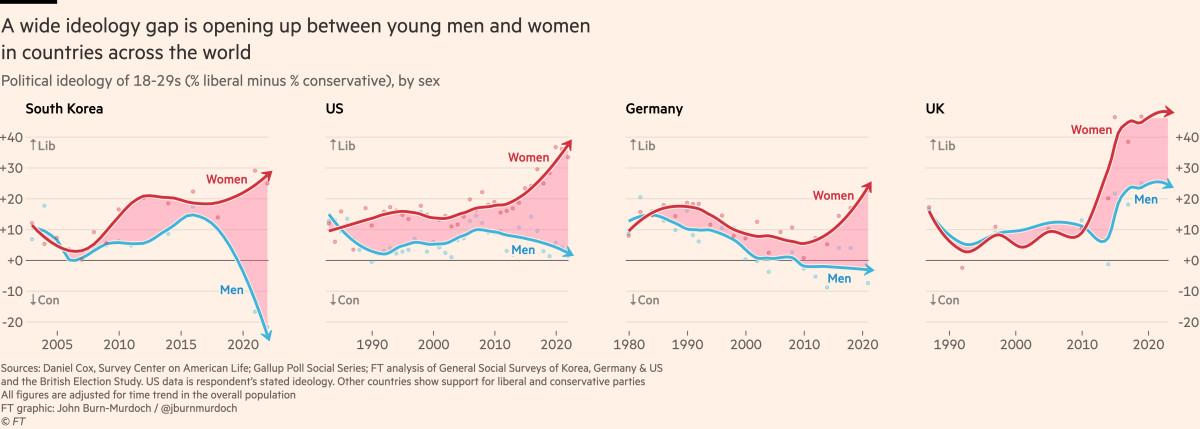RamsayBolton
Superstar
 with both trending in opposite directions somethings gotta give
with both trending in opposite directions somethings gotta give
A new global gender divide is emerging
Young men and young women’s world views are pulling apart. The consequences could be far-reaching
 www.ft.com
www.ft.com

Please use the sharing tools found via the share button at the top or side of articles. Copying articles to share with others is a breach of FT.com T&Cs and Copyright Policy. Email licensing@ft.com to buy additional rights. Subscribers may share up to 10 or 20 articles per month using the gift article service. More information can be found here.
A new global gender divide is emerging
In the US, UK and Germany, young women now take far more liberal positions on immigration and racial justice than young men, while older age groups remain evenly matched. The trend in most countries has been one of women shifting left while men stand still, but there are signs that young men are actively moving to the right in Germany, where today’s under-30s are more opposed to immigration than their elders, and have shifted towards the far-right AfD in recent years. It would be easy to say this is all a phase that will pass, but the ideology gaps are only growing, and data shows that people’s formative political experiences are hard to shake off. All of this is exacerbated by the fact that the proliferation of smartphones and social media mean that young men and women now increasingly inhabit separate spaces and experience separate cultures.
Please use the sharing tools found via the share button at the top or side of articles. Copying articles to share with others is a breach of FT.com T&Cs and Copyright Policy. Email licensing@ft.com to buy additional rights. Subscribers may share up to 10 or 20 articles per month using the gift article service. More information can be found here.
A new global gender divide is emerging
Too often young people’s views are overlooked owing to their low rates of political participation, but this shift could leave ripples for generations to come, impacting far more than vote counts.
Another article:
Gen Z's gender divide is huge — and unexpected
Gen Z women are becoming more liberal, while Gen Z men are drifting to the right. Now, they don't agree on anything.
Most young men are probably not interested in making America great again, but they do feel acutely the need to secure a place for themselves in a culture that readily identifies male advantage but ignores the challenges young men face. Out of a sense of increased insecurity, more young men are adopting a zero-sum view of gender equality — if women gain, men will inevitably lose. It's an outlook that makes them defensive, encourages them to ignore or overlook enduring challenges women face in society, and can even spur misogyny. As one 35-year-old man told Pew in 2022 about #MeToo: "Too many people are taking advantage of a serious situation because it's trendy or they are greedy or just want attention." And this attitude has real-world consequences: In the online gaming world, 75% of Gen Z women have reported experiencing harassment.
But both genders are feeling increasingly precarious — and it's causing them to drift further apart. A recent Washington Post editorial lamented what this growing political divide means for dating and marriage: If Gen Z men and women can't agree on politics, it's going to get harder for them to find a partner. But if anything, that understates the problem. Based on our interviews, there appears to be a growing eagerness among both young men and women to blame their problems on each other. And a society in which men and women see their interests as irrevocably opposed is not one that can last.

